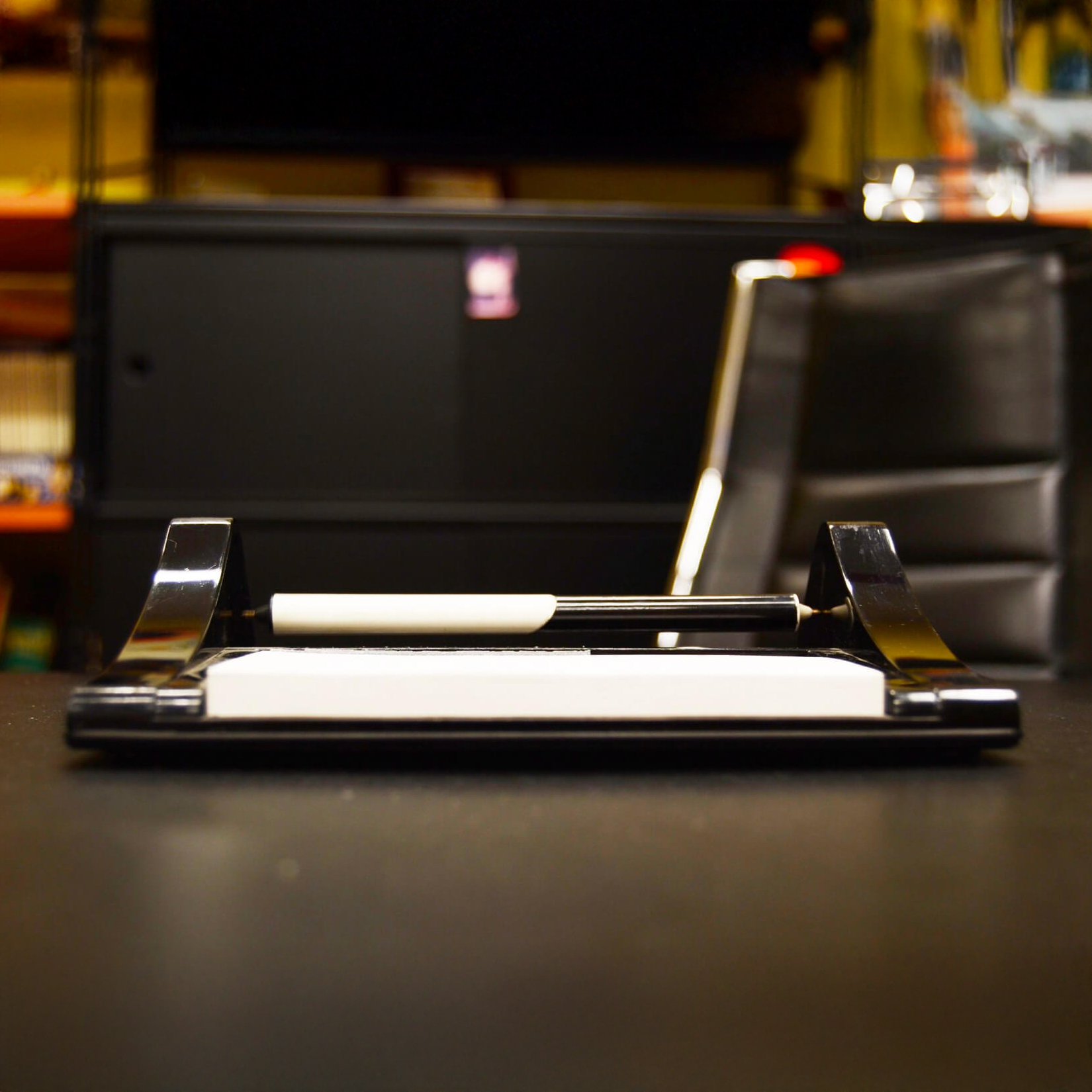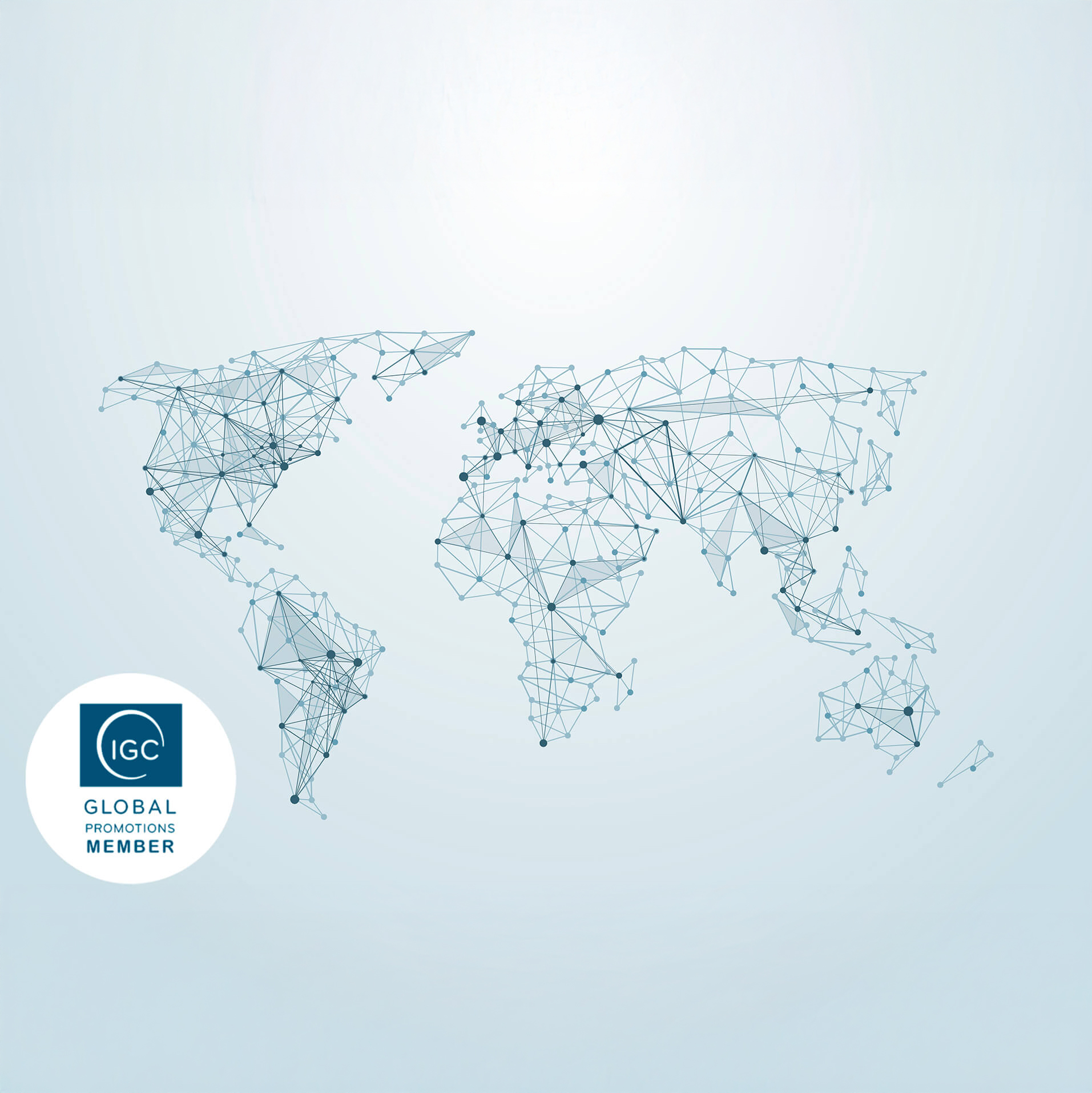Our story: communicating through wonder
How did the creativity of a visionary man benefit the personalized corporate promotional sector? It all started with sleight of hand: that ancient art of magic tricks which, since the beginning of the entertainment world, has entertained courts and royal families before evolving into a more popular art, impressing people of all ages and social backgrounds.

The magic
The founder of Solution Group, Jean Xueref (a name derived from distant Tunisian origins), began studying magic in his free time at the age of 26. A somewhat uncommon hobby that over time became increasingly fascinating to him, making him increasingly skilled. Shortly after, he began performing in small venues, attending magic circles, and entering an "underground" circuit of people who shared this same passion.
Meanwhile, working in the advertising sector for a well-known art magazine in the 80s, he began to notice that many companies use promotional items to advertise their brands. He especially noted the repetitiveness with which certain objects were used by multiple brands. If there was a particular novelty, you could be sure to see the same object customized with multiple logos from different sectors. This is where he began to ask questions.
Why give away an object like a pen holder with the logo of a
famous beverage brand?
Why are there common objects with incomprehensible drug names
printed on them?
Why are promotional gifts always the same?
He began to understand that all the money spent on customizing office objects was just an attempt by multinational companies to expose their brands to the eyes of the average citizen, with consistency, regularity, and daily presence.
It's obvious that if I have a pen holder with the Coca-Cola logo on my desk, subconsciously the next time I want a carbonated drink, my choice will tend toward that brand. This is because in recent months, days, and hours, I've had that logo in view with the corner of my eye. Slowly it has calcified in my subconscious, until influencing my choice at the moment of purchase.
A very effective method if studied at a psychological level.
But there was no need to go into scientific details about why it worked. The multinationals knew it and still know it today. The average citizen doesn't think about it. Jean at that moment had a sort of revelation thinking that, however boring the objects might be, if they weren't thrown away immediately, and if they were used correctly, then they were a winning formula for increasing sales.
Increasing the creativity of the customized corporate products offering
What was the main problem? The monstrous boredom and banality of the gift that was distributed. If they give you a pen at a supermarket with the Esselunga brand, there's a risk that it will be lost on the way home. It's a low-cost item, which at that moment doesn't have an immediate utility, and being free doesn't hold a certain importance in ensuring its arrival at your home. If it does make it, however, very likely for a period of time, that pen will be used, and the Esselunga brand will be magically under your eyes until the pen runs out, gets lost, or is thrown away. Then one day returning home from work, passing in front of an Esselunga supermarket, you stop and make a purchase. This is the power of a simple personalized pen.
Customer attention
Now imagine if Esselunga gave you the new Apple tablet just released that costs almost €1000 instead of the pen. With such customer attention, there's no doubt you will be loyal to that supermarket until death do you part. You will always try to be grateful to a brand that made you such a gift. But above all, you will know that with your loyalty to the brand, over time you will receive gifts of the same value. An extremely winning solution for long-term customer loyalty. However, it's obvious that almost no multinational has a budget to make such gifts. For this reason, the promotional world usually focuses on low-cost products with a more or less short life.
The multinational must therefore ask itself a very precise question and undertake sometimes courageous choices that may have a significant return on investment (ROI). Jean immediately understood that to be successful with a promotional item, he not only had to focus on the usefulness of the item, but also had to invest time and money on originality. A low-cost but beautiful gadget. Give the consumer the desire to bring it home and show it to their loved ones.
Being a magician as a hobby, and knowing very well the reactions of people at the moment of the magic effect, he tried to associate the amazement that his audience had with the amazement that a consumer might have when receiving the gift. Why not create magical objects with a utility, which would have an effect every time they were used? Or better, why not give away simple magic tricks that people could have fun doing for their children, friends, and colleagues?
From here came a winning idea for customized promotional products!
In the mid-80s, a well-known pharmaceutical company was about to launch a drug that cured ulcers. Jean noticed that especially in the pharmaceutical sector, most of their advertising budgets went to the production of office items and promotional objects personalized with the brand of the drugs, to be given to doctors and hospitals. If the doctor had the name of the drug constantly under his eye, the moment a patient presented with a particular condition, the doctor ended up prescribing the drug that best suited to solve the patient's problem. The doctor tended and still tends to administer the drug to which he is most exposed daily. In this case, most of the time, it is the drug for which the doctor has received the gift or promotional item.
The promotional market for the pharmaceutical industry
The pharmaceutical industry, especially in those years, dominated the promotional sector. It was a business volume of billions and billions of lire. This was because for conditions where the drug had to be prescribed, the end customer was no longer the average consumer, but was the doctor. The pharmaceutical company had to convince doctors that their drug was more effective than others. For this reason, doctors were "pampered" by pharmaceutical companies with many promotional gadgets, personalized medical instruments, and a bit more incorrectly with medical conferences in five-star resorts with trips and expenses paid.
Over the years, thanks to European legislation, these types of "incorrect" attitudes, especially in an industry where we are talking about people's health, have been regulated by limiting the freedom of pharmaceutical companies. The gadget is still allowed and authorized but has limits and strict controls on utility. Vacations and 5-star resorts are no longer given away, and also thanks to the crisis of the last decade, budgets have considerably narrowed.
The magic box
In the 80s and 90s, however, the pharmaceutical promotional market was rich, extremely competitive, and devoid of rules. Jean, one day had an insight. He had a very simple magic trick. A small box with a drawer that opened. You put something inside it, closed the drawer, and reopening it, its contents disappeared. A simple magic trick that didn't require particular techniques and that could be learned in a few seconds knowing the trick.
But how to associate a magic trick with the pharmaceutical industry? How to find a connection between a promotional object intended for doctors to promote a drug, and an entertainment and amazement item? Simple. With a creative and effective communicative concept.
The drug makes the disease disappear, the promotional item makes the drug disappear
Jean picked up the phone and called the pharmaceutical company that was about to launch this new drug that cured ulcers. He asked for an appointment to introduce an effective and innovative promotional novelty. At the time, competition was restricted and making an appointment with the marketing departments of multinationals was much simpler than today. There was more money, time, and flexibility.
The day of the meeting arrives, and he enters a meeting room with 5 executives sitting around the table.
He introduces himself as an amateur magician who works in advertising and specifies that he had a magic trick that could advertise the new drug that was coming out.
Obviously, the looks were of skepticism and almost embarrassment. Let's remember that these people, used to promoting products to doctors and nurses, wanted anything but to joke around and act like clowns in front of such professional figures.
Jean, of course, had gone very well prepared. He had taken a magic box and had it customized with the drug's logo. At that point, he pulls it out and says, "Your drug makes the ulcer disappear. I make the drug disappear." He takes a small sample box of the drug present on the table, introduces it into the box, and closes it. When he reopens it, the drug is no longer there.
Amazing to communicate
At that point, in the grip of amazement, the executives begin to examine the box without finding the trick until they ask for explanations. The box again in Jean's hands reopens and the drug reappears. At that point, he decides to explain it to everyone present in the room. Shortly after, they were all trying the magic box with loud smiles on their faces. The trick was simple, and everyone could execute it easily. Jean knew he had hit the mark.
However, they thanked him, explaining that their sector was a bit complex and left little room for smiles and advertising experiments outside the norm.
A bit perplexed, he left the box there on the table as a gift and left. After two weeks, Jean's phone rang. It was the marketing director of the pharmaceutical company. It was the call that changed his life. Marketing had decided to experiment with this object. As it seemed, after the meeting ended, the various executives began to show the game to their colleagues. Someone brought it home and showed it to his wife and children. In short, the item was of interest and was used by quite a few people. This made marketing realize that it could also work with doctors.
They asked Jean for a supply of 100,000 pieces and as the English say, "The rest is History".
Thus, Solution Group was born. Over the years, Jean met other people in the industry with whom he collaborated, creating original objects. They designed products distinguishing themselves in the industry as the most creative promotional agency on the European market. Here are some examples:
The magic pen holder
With a mirror effect, the body of the pen disappears inside the pen holder. The idea of this original promotional item was to write the word "Diabetes" on the pen and the name of the drug on the pen holder. By inserting the pen, the word diabetes disappeared. Diabetes disappears with the application of the drug.
The suspended pen
The pen holder has two magnets on the sides of the base. The pen remains suspended in the air. The visual effect of the balanced pen was used to launch a drug that restored and balanced the hormonal values in the blood of the patient using the drug.
The press up: a post-it holder that rises by itself
A small notepad packaged in a box with a small button containing a spring. By pressing the button, the notepad rises magically, facilitating writing. This was created to promote a revolutionary drug against erectile dysfunction.
Today: leader in the promotional sector
Obviously, over the years, Solution Group grew with an extremely professional staff. Jean partnered with other creative minds who helped the company grow, until making it what it is today. Leader in the promotional sector; pharmaceutical and otherwise.
Today our clients range from food, to sports, to the automotive world and cosmetics. We supply telecommunications multinationals and, of course, we specialize in any customizable article with a company logo. Whether it's for an advertising campaign, promotional or simply customized clothing, Solution Group is able to provide a professional service at 360 degrees included. This includes logistics, shipping, imports, and certifications that are increasingly necessary to work safely in the EU. Especially with multinationals.
This is the story of how Solution Group has differentiated itself over the years in the offering of creative promotional objects. A true success story.


